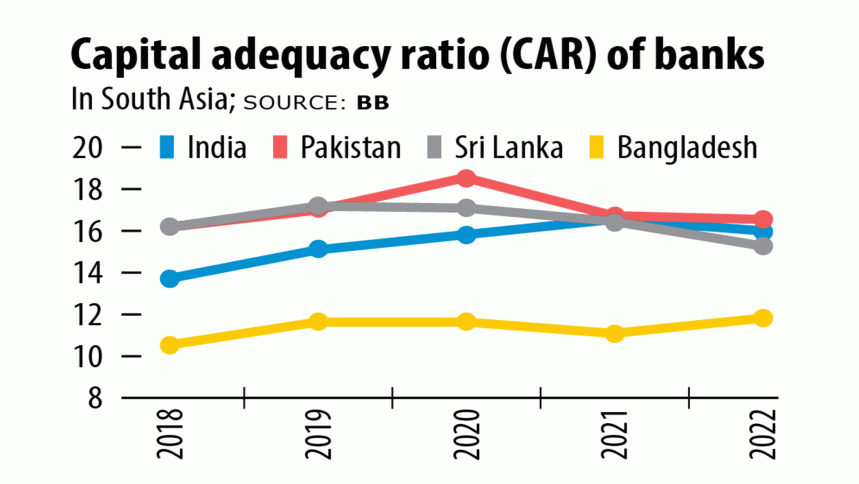Local banks have lowest capital base in South Asia

Banks in Bangladesh were bottom-ranked in 2022 among South Asian lenders when it comes to capital base, owing largely to rising non-performing loans.
According to the Bangladesh Bank's Financial Stability Report 2022, local banks maintained a capital adequacy ratio (CAR) of 11.83 percent last year.
It was 16 percent for India, 16.6 percent for Pakistan and 15.3 percent for Sri Lanka.
The CAR, also known as the capital-to-risk weighted assets ratio, is an indicator of how well a bank can meet its obligations.
The capital base of local banks has been the lowest in South Asia for several years.
In 2017, local banks maintained a 10.8 percent CAR while India had a CAR of 13.9 percent, Pakistan 15.8 percent, and Sri Lanka 16.4 percent.
Although the capital base of banks has continued to rise, it is still lower than the lenders in the neighbouring countries. Local bankers say the capital base is not strengthening due to the growing bad loans.

NPLs totalled Tk 131,620 crore in March, marking a 16.02 percent increase year-on-year, Bangladesh Bank data showed. The volume was 8.80 percent of the total credits disbursed in the banking sector.
A central banker says local banks maintained the lowest capital base in the region due to the capital shortfall of a dozen of banks, including state-run lenders. On the other hand, the capital base of private banks and foreign banks is in good shape.
In March, the CAR of six state-run banks stood at 5.90 percent. It was negative 38.35 percent for three specialised banks, BB data showed.
In contrast, the CAR of private banks was 13.08 percent and that of foreign banks stood at 31.48 percent.
Eleven banks faced a capital shortfall at the end of March, with Bangladesh Krishi Bank posting the highest deficit of Tk 14,094 crore among all lenders.
Salehuddin Ahmed, a former governor of the central bank, said a large portion of loans have remained stuck with defaulters, meaning banks don't get any return from them.
"Besides, there are loans that have been rescheduled and written off."
Banks' capital base usually widens when they can make equity investments and re-invest.
"How will banks invest or reinvest since the income of a majority of them has fallen," Ahmed said, adding that banks' risk-weighted assets pile up when their capital base weakens.
The former governor says foreign investors feel discomfort when lenders' capital base worsens.
"The banking regulator is aware of the current situation of banks but it is not taking any effective initiative."

 For all latest news, follow The Daily Star's Google News channel.
For all latest news, follow The Daily Star's Google News channel. 







Comments